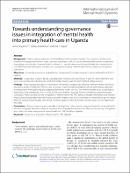| dc.contributor.author | Mugisha, James | |
| dc.contributor.author | Ssebunnya, Joshua | |
| dc.contributor.author | Kigozi, Fred N. | |
| dc.date.accessioned | 2022-01-17T12:10:31Z | |
| dc.date.available | 2022-01-17T12:10:31Z | |
| dc.date.issued | 2016-03-24 | |
| dc.identifier.citation | Mugisha, James ;Ssebunnya, Joshua ;Kigozi, Fred N. (2016). Towards understanding governance issues in integration of mental health into primary health care in Uganda. Springer Nature: International Journal of Mental Health Systems. DOI 10.1186/s13033-016-0057-7. | en_US |
| dc.identifier.uri | DOI 10.1186/s13033-016-0057-7 | |
| dc.identifier.uri | https://kyuspace.kyu.ac.ug/xmlui/handle/20.500.12504/223 | |
| dc.description | 14 p. | en_US |
| dc.description.abstract | There is a growing burden of mental illness in low income countries. The situation is further worsened
by the high poverty levels in these countries, resulting in difficult choices for their health sectors as regards to
responding to the burden of mental health problems. In Uganda, integration of mental health into primary health
care (PHC) has been adopted as the most vital strategy for ensuring mental health service delivery to the general
population.
Objectives: To identify governance related factors that promote/or hinder integration of mental health into PHC in
Uganda.
Methods: A qualitative research design was adopted at national and district level. A total of 18 Key informant interviews
were conducted at both levels. Content thematic analysis was the main method of data analysis.
Findings: There were positive gains in working on relevant laws and policies. However, both the mental health law
and policy are still in draft form. There is also increased responsiveness/participation of key stakeholders; especially
at national level in the planning and budgeting for mental health services. This however seems to be a challenge at
both district and community level. In terms of efficiency, human resources, finances, medicines and technologies
constitute a major drawback to the integration of mental health into PHC. Ethics, oversight, information and monitoring
functions though reported to be in place, become weaker at the district level than at national level due to limited
finances, human resources gaps and limited technical capacity. Other governance related issues are also reported in
this study.
Conclusions: There is some progress especially in the legal and policy arena to support integration of mental health
into PHC in Uganda. However, adequate resources are still required to facilitate the effective functioning of all governance
pillars that make integration of mental health into PHC feasible in Uganda. | en_US |
| dc.language.iso | en | en_US |
| dc.publisher | Springer Nature: International Journal of Mental Health Systems. | en_US |
| dc.subject | Governance | en_US |
| dc.subject | Integration | en_US |
| dc.subject | Mental health | en_US |
| dc.subject | PHC | en_US |
| dc.subject | Uganda | en_US |
| dc.title | Towards understanding governance issues in integration of mental health into primary health care in Uganda | en_US |
| dc.type | Article | en_US |

